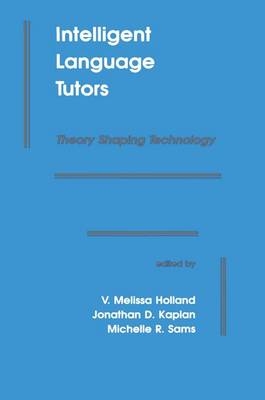
Intelligent Language Tutors
Routledge (Verlag)
978-1-138-97290-2 (ISBN)
- Titel ist leider vergriffen;
keine Neuauflage - Artikel merken
The book is organized into sections that express the levels of analysis dealt with in learning and teaching a language and with the tasks of the student as writer, reader, conversant, and actor in the world. These sections bring together research by specialists in linguistics, artificial intelligence, psychology, instructional design, and language teaching. In addition to providing detailed descriptions of working systems, amply illustrated with screens from lesson and authoring interfaces, the contributors address a spectrum of common issues:
* What can current NLP technology contribute to computer-assisted language instruction and to research on language learning?
* How can this technology meet the demands of pedagogical theory for communicative language teaching in authentic contexts?
* How can designers constrain tutoring environments to ensure accurate analysis of learners' language?
* What can NLP-based systems teach us about language acquisition, about linguistic theory, and about theories of language pedagogy?
* What lessons have been learned in using these systems to date?
Discipline-specific issues are illuminated as well: the relative merits of the major syntactic frameworks for NLP-based language tutoring; the adaptation of theories like lexical conceptual structure to support semantic interpretation; the integration of input language with visual microworlds and dialogue games; the pragmatics of the tutoring discourse; the selection of instructional principles to guide system design; and the accomodation of design to individual differences and learner styles. A concluding section assesses this work from larger theoretical and practical perspectives -- experimental psychology and psycholinguistics, linguistics, language teaching, and second language acquisition research.
Contents: V.M. Holland, Introduction: The Case for Intelligent CALL. Part I:Text-Based Language Tutors and Learning Environments. M.R. Sams, Advanced Technologies for Language Learning: The BRIDGE Project Within the ARI Language Tutor Program. A. Weinberg, J. Garman, J. Martin, P. Merlo, A Principle-Based Parser for Foreign Language Tutoring in German and Arabic. S. Kreyer, E. Criswell, Instructor as Author in an Adaptive, Multimedia, Foreign Language Tutor. M. Rypa, K. Feuerman, CALLE: An Exploratory Environment for Foreign Language Learning. L.S. Levin, D.A. Evans, ALICE-chan: A Case Study in ICALL Theory and Practice. C.H. Frederiksen, J. Donin, M. Décary, A Discourse Processing Approach to Computer-Assisted Language Learning. D. Loritz, GPARS: A Suite of Grammar Assessment Systems. Part II:Dialogue-Based Language Games. R.H. Sanders, A.F. Sanders, History of an AI Spy Game: Spion. W.H. DeSmedt, Herr Kommissar: An ICALL Conversation Simulator for Intermediate German. Part III:Graphics-Based Language Tutors and Learning Environments. H. Hamburger, Tutorial Tools for Language Learning by Two-Medium Dialog. S.A. Douglas, LingWorlds: An Intelligent Object-Oriented Environment for Second-Language Tutoring. R.S. Tomlin, Modeling Individual Tutorial Interactions: Theoretical and Empirical Bases of ICALL. J.H. Murray, Lessons Learned from the Athena Language Learning Project: Using Natural Language Processing, Graphics, Speech Processing, and Interactive Video for Communication-Based Language Learning. S. Felshin, The Athena Language Learning Project NLP System: A Multilingual System for Conversation-Based Language Learning. J.D. Kaplan, V.M. Holland, Application of Learning Principles to the Design of a Second Language Tutor. B. Dorr, J. Hendler, S. Blanksteen, B. Migdaloff, On Beyond Syntax: Use of Lexical Conceptual Structure for Intelligent Tutoring. Part IV:Theoretical Issues in Language Tutor Design and Assessment. B. MacWhinney, Evaluating Foreign Language Tutoring Systems. A. Bailin, AI and Language Learning: Theory and Evaluations. N. Garrett, ICALL and Second Language Acquisition. R.L. Oxford, Linking Theories of Learning with Intelligent Computer-Assisted Language Learning (ICALL).
| Erscheinungsdatum | 20.07.2016 |
|---|---|
| Verlagsort | London |
| Sprache | englisch |
| Maße | 152 x 229 mm |
| Gewicht | 336 g |
| Themenwelt | Geisteswissenschaften ► Psychologie ► Allgemeine Psychologie |
| Geisteswissenschaften ► Psychologie ► Verhaltenstherapie | |
| Geisteswissenschaften ► Sprach- / Literaturwissenschaft ► Sprachwissenschaft | |
| Informatik ► Theorie / Studium ► Künstliche Intelligenz / Robotik | |
| Sozialwissenschaften ► Pädagogik | |
| ISBN-10 | 1-138-97290-8 / 1138972908 |
| ISBN-13 | 978-1-138-97290-2 / 9781138972902 |
| Zustand | Neuware |
| Informationen gemäß Produktsicherheitsverordnung (GPSR) | |
| Haben Sie eine Frage zum Produkt? |
aus dem Bereich


